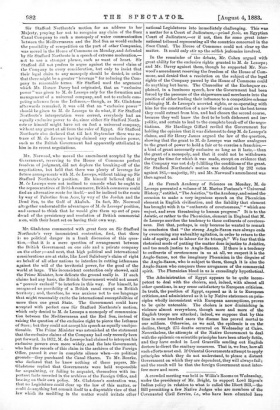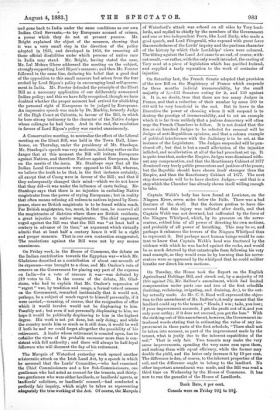A crowded meeting was held in Willis's Rooms on Wednesday,
under the presidency of Mr. Bright, to support Lord Ripon's Indian policy in relation to what is called the Ilbert Bill,—the Bill permitting a few Native Judges who are members of the Covenanted Civil Service, i.e., who have been educated here and gone back to India under the same conditions as our own Indian Civil Servants,—to try Europeans accused of crimes, a power which they do not at present possess. Mr. Bright explained the object of the measure, showing that it was a very small step in the direction of the policy adopted in 1833, and developed in 1858, for removing all those official disabilities under which persons of native race in India may stand. Mr. Bright, having stated the case, Mr. Lal Mohan Ghose addressed the meeting on the subject, stronglysupporting Lord Ripon's measure; and then Mr. Forster followed in the same line, declaring his belief that a good deal of the opposition to this small measure had arisen from the fear excited by Lord Ripon's policy in encouraging local self-govern- ment in India. Mr. Forster defended the principle of the Ebert Bill as a necessary application of our deliberately announced Indian policy; and this we have fully recognised, though we have doubted whether the proper moment had arrived for abolishing the personal right of Europeans to be judged by Europeans. An impressive speech was made by Dr. Markby, formerly Judge of the High Court at Calcutta, in favour of the Bill, in which he bore strong testimony to the character of the Native Judges whose colleague he had been. And in the end, the resolution in favour of Lord Ripon's policy was carried unanimously.



































 Previous page
Previous page